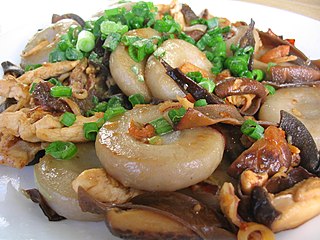
Hakka cuisine is the cooking style of the Hakka people, and it may also be found in parts of Taiwan and in countries with significant overseas Hakka communities. There are numerous restaurants in Mainland China, Taiwan, Hong Kong, Indonesia, Malaysia, Singapore, and Thailand serving Hakka cuisine. Hakka cuisine was listed in 2014 on the first Hong Kong Inventory of Intangible Cultural Heritage.

Taiwanese cuisine is a popular style of food with several variations, including Chinese and that of Taiwanese indigenous peoples, with the earliest cuisines known of being the indigenous ones. With over a hundred years of historical development, mainstream Taiwanese cuisine has been influenced by Hakka cuisine, the cuisines of the waishengren, Japanese cuisine, and American cuisine, with southern Fujian cuisine having had the most profound impact.

Dim sum is a large range of small Chinese dishes that are traditionally enjoyed in restaurants for brunch, with a “selection of over 1,000 varieties of small-plate Chinese foods, usually meat or vegetables in dough or a wrapper that is steamed, deep-fried or pan-fried.” Most modern dim sum dishes are commonly associated with Cantonese cuisine, although dim sum dishes also exist in other Chinese cuisines. In the tenth century, when the city of Canton (Guangzhou) began to experience an increase in commercial travel, many frequented teahouses for small-portion meals with tea called "yum cha" (brunch). "Yum cha" includes two related concepts. The first is "jat zung loeng gin", which translates literally as "one cup, two pieces". This refers to the custom of serving teahouse customers two delicately made food items, savory or sweet, to complement their tea. The second is dim sum, which translates literally to "touch the heart", the term used to designate the small food items that accompanied the tea.
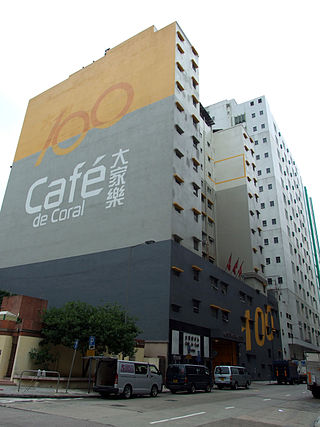
Café de Coral Holdings, Ltd. is a Hong Kong fast-food restaurant group that owns and operates fast-food chains and restaurants, including Café de Coral, Super Super, The Spaghetti House, Oliver's Super Sandwiches, Ah Yee Leng Tong, and others.
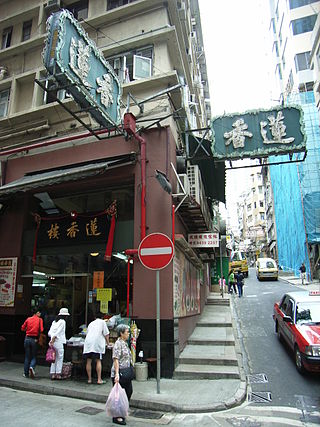
Hong Kong cuisine is mainly influenced by Cantonese cuisine, European cuisines and non-Cantonese Chinese cuisines, as well as Japanese, Korean and Southeast Asian cuisines, due to Hong Kong's past as a British colony and a long history of being an international port of commerce. Complex combinations and international gourmet expertise have given Hong Kong the labels of "Gourmet Paradise" and "World's Fair of Food".
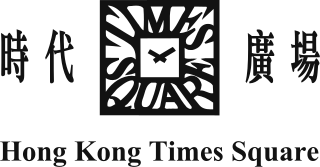
Times Square is a luxury shopping centre and office tower complex in Causeway Bay, Hong Kong. The complex, owned by Wharf Properties, part of The Wharf (Holdings) Limited group, opened on 13 April 1994.

Dai pai dong is a type of open-air food stall. The term originates from Hong Kong but has been adopted outside Hong Kong as well. The official government name for these establishments is "cooked-food stalls". The more common name, dai pai dong, literally means "big licence stall" in Cantonese, referring to the stalls' license plates, which are larger than those of other licensed street vendors.
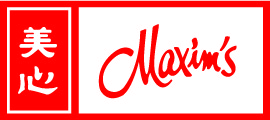
Maxim's Caterers Limited is a Hong Kong based food, beverage and restaurant chain jointly owned by Dairy Farm International Holdings Limited and Hong Kong Caterers Ltd.

Jumbo Kingdom consisted of the Jumbo Floating Restaurant and the adjacent Tai Pak Floating Restaurant, which were tourist attractions in the Aberdeen South Typhoon Shelters within Hong Kong's Aberdeen Harbour. During its 44 years of operation, over thirty million visitors visited Jumbo Kingdom, including Queen Elizabeth II, Jimmy Carter, Tom Cruise, Chow Yun Fat, and Gong Li. A subsidiary, Jumbo Kingdom Manila, operated in Manila Bay, Philippines, but closed after eight years. Jumbo Kingdom was part of Melco International Development Limited, a company listed on the Hong Kong Stock Exchange. It suspended operations in 2020 amidst the COVID-19 outbreak.

Kowloon Shangri-La is a five-star hotel of the Hong Kong-based Shangri-La Hotels and Resorts group. It is located on Mody Road in Tsim Sha Tsui East overlooking Victoria Harbour and the Hong Kong Island skyline. It is the sister hotel to the Island Shangri-La in Admiralty district, Hong Kong.

Amigo is a French and Western cuisine restaurant in Hong Kong. It was created by owner Yeung Wing Chung (楊永忠) and his staff. Yeung's wife came up with the Spanish name Amigo, meaning "friend". It is located on Wong Nai Chung Road, Happy Valley. Some of their signature dishes include: whole fresh Tasmanian lobster, braised oxtail stew, foie gras, lobster bisque, scallop chowder, fish chowder, bisque d'escargot, roasted rack of lamb, Mongolian raw beef appetiser and warmed salted ox-tongue with mesclun salad, and Napoleon celebration cake and soufflé

Forum Restaurant is a Cantonese restaurant officially established in 1977. It is located at Sino Plaza, Causeway Bay, Hong Kong since 2014. Run by Hong Kong's international chef and ambassador of Chinese cuisine, Yeung Koon-yat (楊貫一), it is known for its expensive abalone dishes.

Fairwood is a fast food chain offering Chinese and Western food. Founded in December 1972 in the Tsuen Wan district of Hong Kong, its current headquarters are located in North Point. Since that time, the company has grown to 98 outlets all over Hong Kong and 13 locations in Mainland China including major cities such as Shenzhen, Guangzhou and Beijing. Behind Café de Coral, Fairwood is the second largest fast food chain in Hong Kong and serves over 100,000 customers each day.

Citygate is a commercial complex at the town centre of Tung Chung, Lantau Island, Hong Kong. It comprises a shopping centre called Citygate Outlets, an office tower, and the Novotel Citygate hotel.
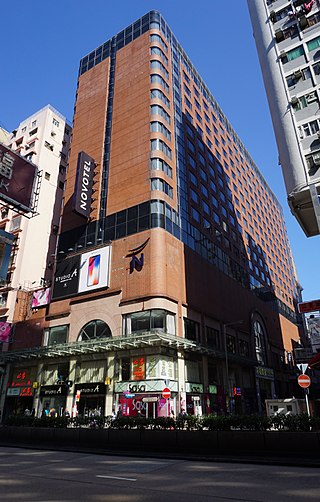
Novotel Hong Kong Nathan Road Kowloon is a 4-star hotel in Kowloon, Hong Kong. Formerly known as the Majestic Hotel, the hotel reopened in April 2008, following a HK$188 million refurbishment programme, upgraded to 4-star and rebranded as a Novotel. The hotel is managed by the hotel group Accor.

Tim Ho Wan is a Hong Kong dim sum restaurant chain originating from Hong Kong. Known for being "the world's cheapest Michelin-star restaurant", the chain has since expanded and now has franchises in 12 countries.

Australia Dairy Company (澳洲牛奶公司) is a traditional Hong Kong restaurant, cha chaan teng, in Jordan, Hong Kong, specialising in steamed milk pudding, scrambled eggs, toast and custard dishes. The company was named by the founder, who had worked on an Australian farm in the 1940s.

Regina Leung Tong Ching-yee is a former solicitor in Hong Kong. She is the wife of Leung Chun-ying, the former Chief Executive of Hong Kong.
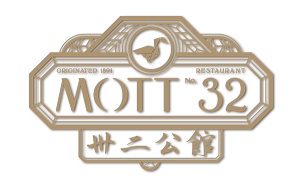
Mott 32 is a Cantonese restaurant owned by Maximal Concepts. As of 2024, Mott 32 has eight locations, including Hong Kong, Las Vegas, Vancouver, Bangkok, Singapore, Seoul, Dubai and Cebu.

Baked pork chop rice is a Hong Kong style Western dish. It is commonly served in Cha Chaan Teng (茶餐廳). The dish combines Eastern and Western culinary influences. It consists of a base of fried rice with egg, which is topped with tomato sauce and cheese. This is then baked until the cheese is melted and then served.




















